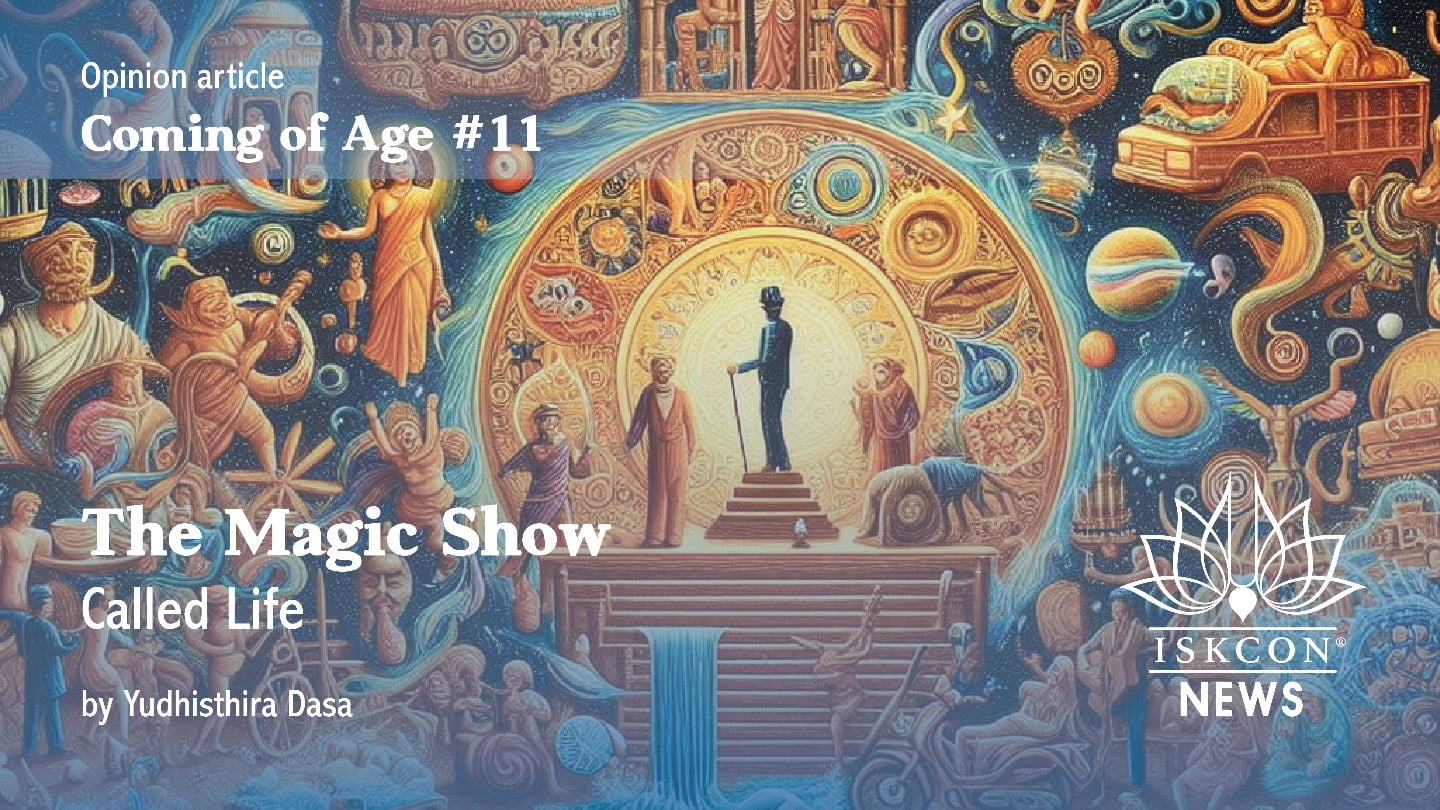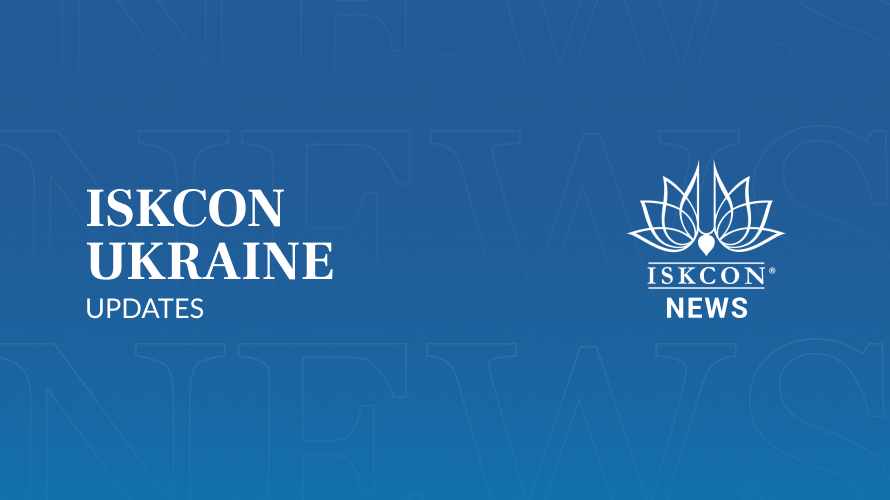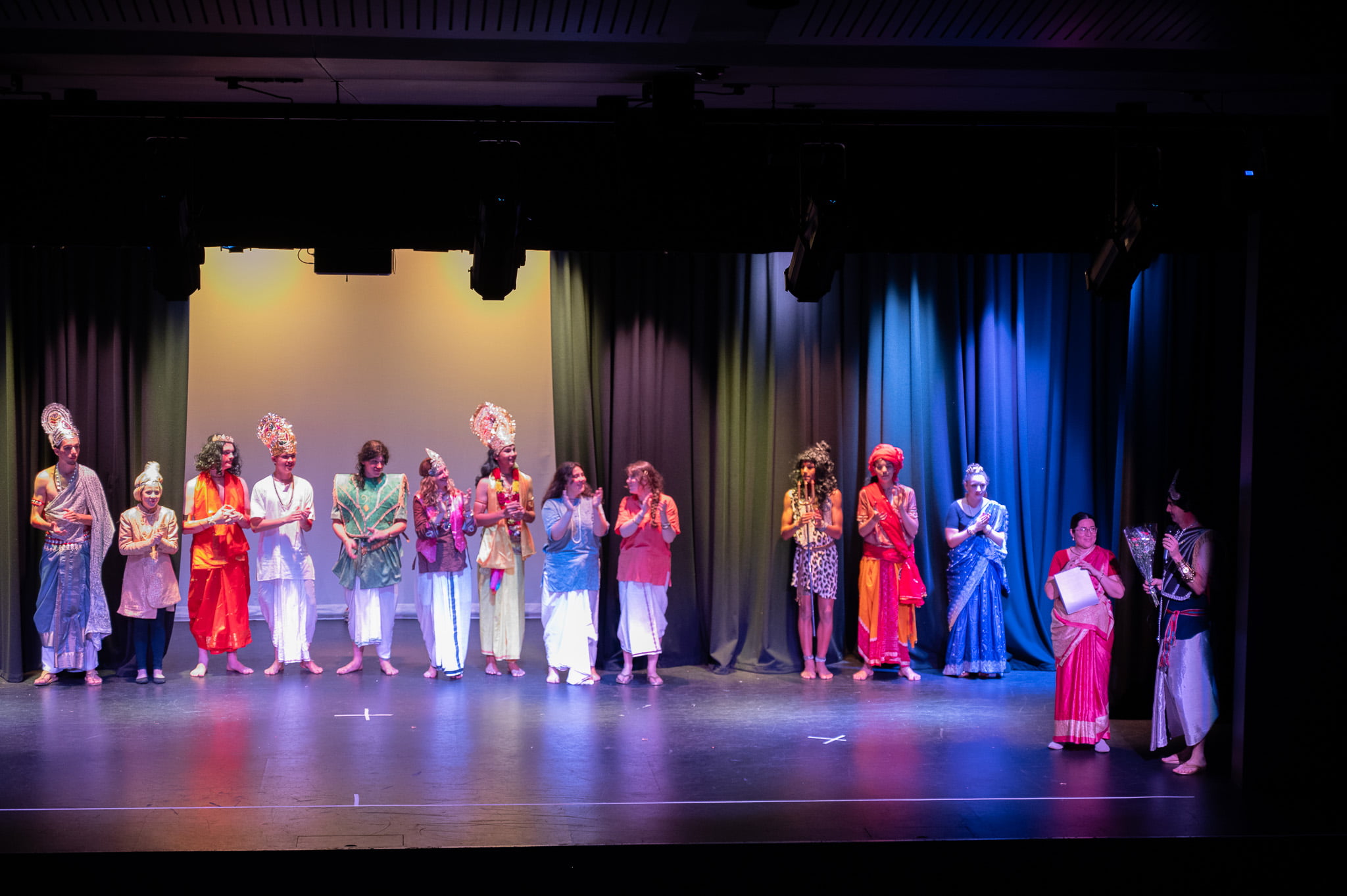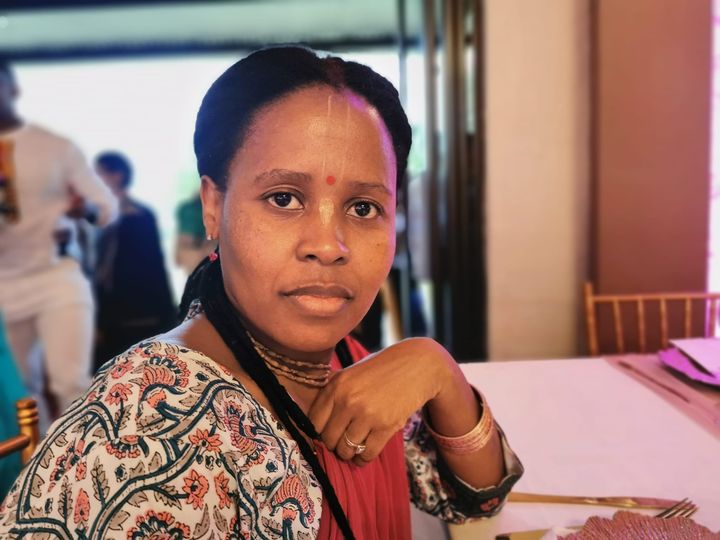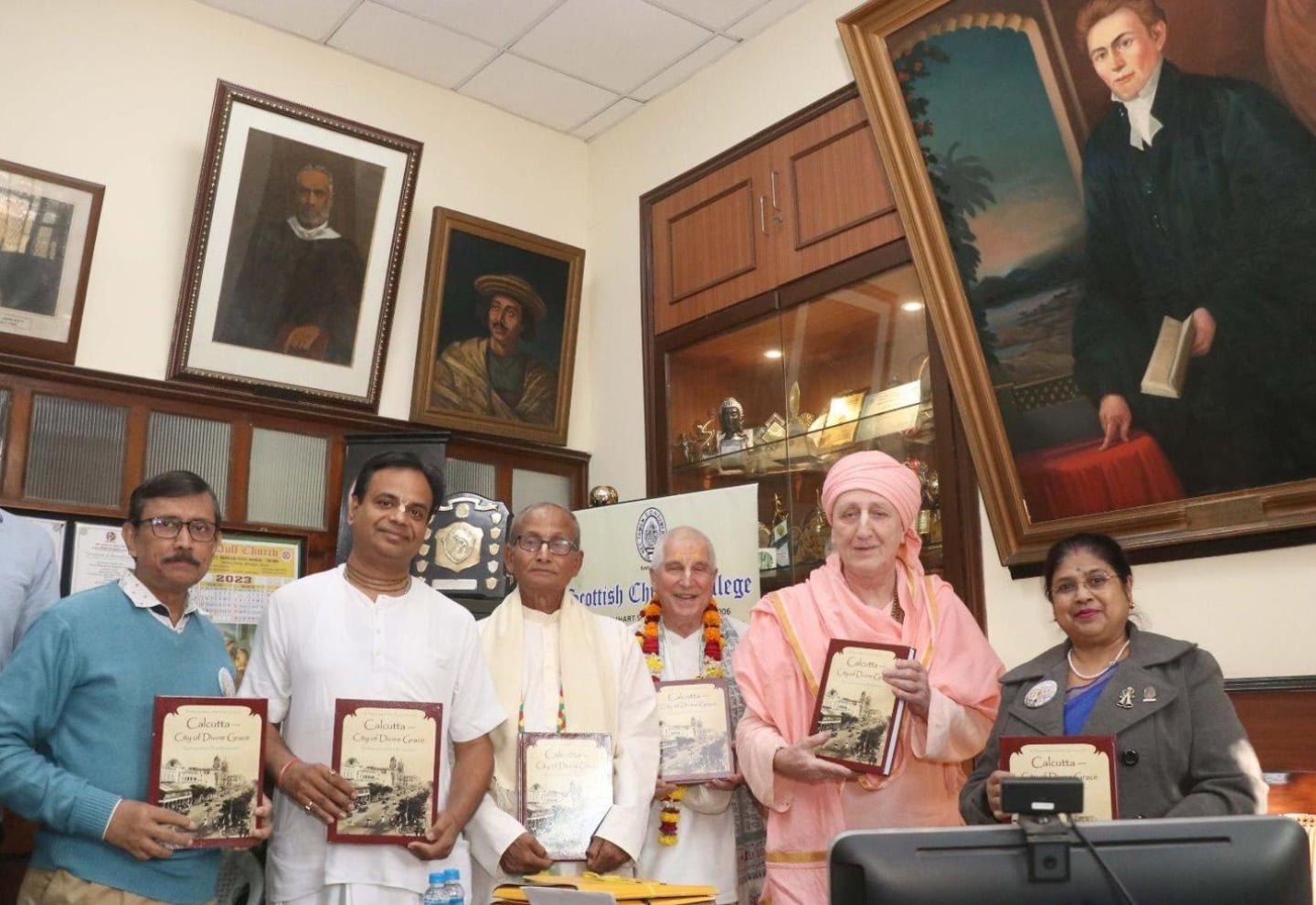BIHS Third Cosmology Workshop
By Lila Ocampo, BIHS Operations Team | Mar 06, 2022
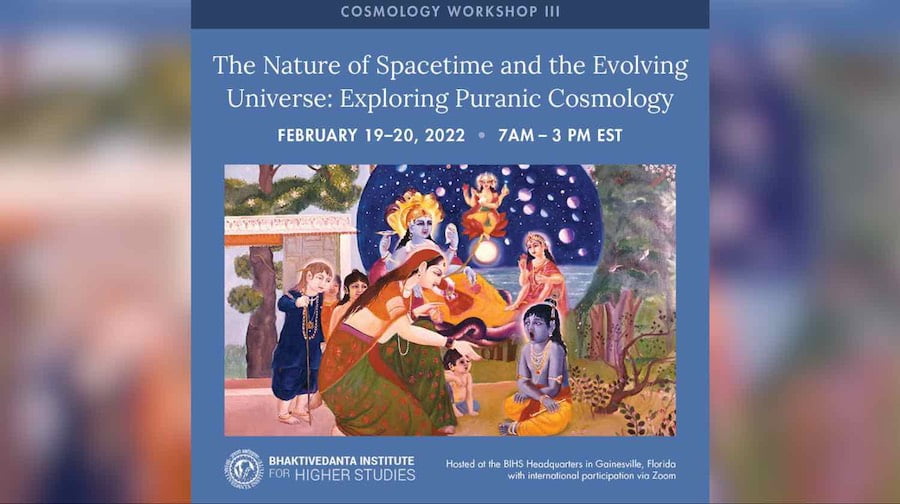
The Bhaktivedanta Institute for Higher Studies Sponsors its Third Cosmology Workshop
In 2019, the Bhaktivedanta Institute for Higher Studies (BIHS) sponsored its initial cosmology workshop, “Taking the 5th… Canto!” This gathering explored the study of Puranic cosmography within ISKCON as an outgrowth of interest raised by the development of the Temple of the Vedic Planetarium (TOVP) in Mayapur, West Bengal. The second workshop in 2020, “Models and Memes and Maps: A Modern Journey through Ancient Cosmography,” aimed toward developing a unified framework for intellectual discourse aspiring to enrich scholarship exploring Puranic cosmology.
This third in the series examined Puranic perspectives on the nature of spacetime and the origin and fate of the universe. With a growing acknowledgment in the academic and scientific discourse of the opportunity for further research, it is important for Vaishnava scholars to actively engage philosophical, mathematical, and experiential frameworks that appreciate both traditional Indic as well as a modern scientific theory.
The Big Bang model currently dominant within contemporary discourse begins with a singular event followed by a rapid period of expansion, known as inflation. While inflationary theory attempts to resolve challenges to earlier models, inflationary models, in turn, invite numerous empirical (and philosophical) concerns. That being said, arguably every purely physical model contains shortcomings in an attempt to explain how or why the universe fully manifests. In response, this workshop put forth sastric perspectives and their teleological implications in a collaborative examination of the potential for a fuller appreciation of cosmological origins and the nature of spacetime.
Prior to the workshop on Friday, February 18, several local participants made a visit to the University of Florida’s Physics Department to attend a lecture by workshop presenter Bhupal Dev, Ph.D., titled “A New Idea for Relic Neutrino Detection,” where he discussed new findings from his current research based on data collected by the IceCube Neutrino Observatory at the Amundsen–Scott South Pole Station in Antarctica. The evening concluded with a casual dinner and meet-and-greet at the Bhaktivedanta Institute Center.
This event, which was attended by participants involved in previous Vedic cosmology initiatives, opened on Saturday morning with BIHS Director Bob Cohen (Brahmatirtha) welcoming local and international presenters and attendees across different countries and time zones. Doug Watson, Ph.D. (Astrophysics) and workshop chair, introduced Session 1: Sastric and Historic Perspectives Concerning the Nature of the Universe, with his talk, “Toward a Comprehensive Picture of the Nature of Spacetime and the Origin and Fate of the Universe,” where he explored the general landscape of the dominant cyclical modes in the current academic literature and discussed the physical and physical implications of such models. Following this, Dr. Krishna Abhishek Ghosh, Director of the Institute for Vaishnava Studies, presented “Questioning Questions: A Vaishnava Epistemology of the Cosmos and Consciousness” and discussed the different forms of epistemes and the prominence of sabda within Vedantic and other traditions.
The first session continued with “Views of the Universe, Defined in Space and Time” by S. E. Kreitzer (Sthita-dhi-muni), Ph.D. (History of Science), which examined shifting concepts of the cosmos by both Puranic and modern scientific thinkers, and “Viewing the Cosmos Through the Lens of Samkhya” by Edwin Bryant, Professor of Religious Studies at Rutgers, who argued that “any attempt to engage the Bhagavata in conversation with more or less any aspect of modern science can only involve Samkhya metaphysics.”
After a lunch break full of discussion and connections, Session 2: Systematically Exploring the Creation of the Universe, was facilitated by Intel executive Purushottam Goel (Parama Karuna), who introduced an afternoon of fascinating talks and discussions by “Exploring 2nd and 3rd Canto Cosmogony Scenarios.” Other presentations included “Vedic Perspective on the Origin of the Universe” by Pandu Santhoju (Pavaneshwar), member of the Bhaktivedanta Vidyapitha and TOVP team, “The Nature of Spacetime and the Evolving Universe: Exploring Puranic Cosmology” by Friedrich Silvia (Sriji) from Germany, and the video production, “What is a Brahmanda and How Large is It?,” by Richard Cole (Radha Mohan), Communications Officer at Bhaktivedanta Manor in the UK.
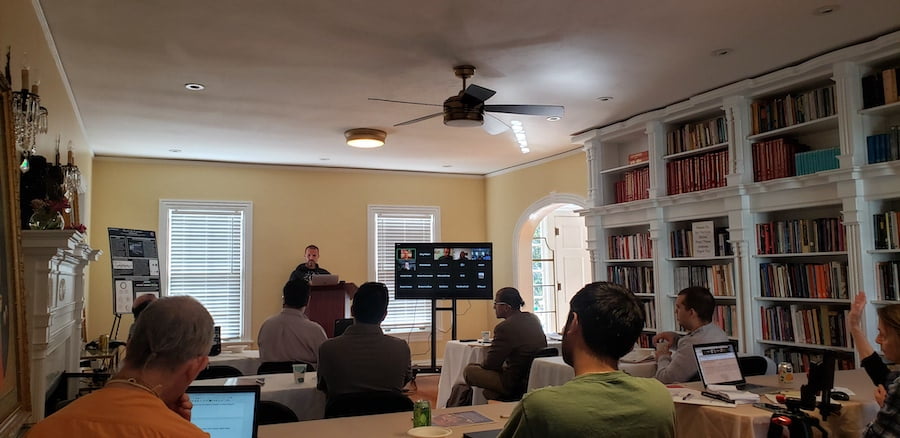 Workshop chair, Doug Watson, gives the opening address
Workshop chair, Doug Watson, gives the opening address
Day 2, Session 3: Seeking Correlations between Space and Time in the Bhagavatam, began with the workshop’s featured speaker Vasyl Semenov (Dvija Govinda), Ph.D. (Acoustics and Computational Math), zooming in from Ukraine with “Space-time Dilation: A Proportionality Approach to the Relevance of ‘Height’ in the Puranic Cosmos,” which highlighted his recent research exploring mathematical transformations based on the concept of the relative perception of distances. This was followed by “Time in Vedic Culture” by Christopher Hayton (Krsna Bhajana), Ph.D. (Social Work), in Wales, and “Big Bang and the Sages” by Sidharth Chhabra (Siddha Hari), who presented in person while visiting from the Harmony Collective located in Ypsilanti, MI. Continuing this theme, “Space-Time Correlation and Cosmology of the Srimad-Bhagavatam” by Punit Bhalla (Prema Gauranga), a researcher for Bhaktivedanta Research Center and TOVP, and “Cycles of Time: An overview of the Penrose Conformal Cyclic Cosmology Model” by Gopal Goel, a freshman in mathematics at MIT and the youngest workshop participant, completed the Sunday morning session
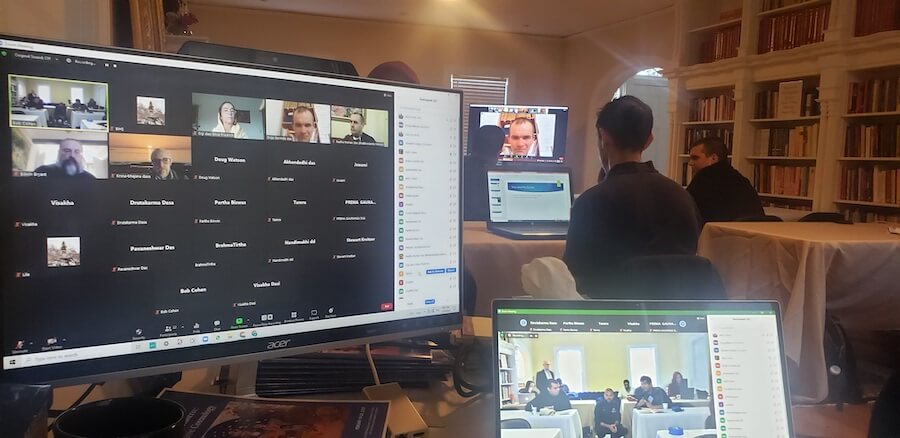 Day 2, Session 2, BIHS Cosmology Workshop
Day 2, Session 2, BIHS Cosmology Workshop
The final Session 4: Conceptualizing the Experience of Space from a Vedic Perspective, was facilitated by Joseph Stover, Professor of Mathematics at Gonzaga University in Washington state. He introduced the session by questioning the meaning of “space” within both consciousness-centric and modern scientific worldviews with his provocative talk, “Grappling with the Concept of Space.” This was followed by “Modern Cosmological Evidence for an Egg-shaped Universe” given by Bhupal Dev, Professor of Astrophysics at Washington University in Saint Louis, and “Conceptual Space” by Venkatesh Chembrolu (Vrindavana Priya), ISKCON Silicon Valley, who drew a distinction between the essential nature of space and its physical counterpart.
Closing out the day and workshop were the presentations “Sankhya and the Foundations of Quantum Mechanics” by Jack Dodson (Kala-Svarupa), a Ph.D. candidate in Particle Physics at Temple University in Philadelphia, and “The Five Elements of Matter and the States of Matter in Modern Science” by Michael Cremo (Drutakarma), a BI member since 1984 and the well-known author of Forbidden Archeology plus many other books dealing with the antiquity of humanity. Last but not least, Mauricio Gaurrido (Murali Gopal), Ph.D. (Physics), surprised the gathering with an unannounced talk, “Spacetime and the Gunas,” which concluded, among other things, that heights in Puranas may be related to the amount of sattva-guna and that time may be related to the amount of rajo-guna.
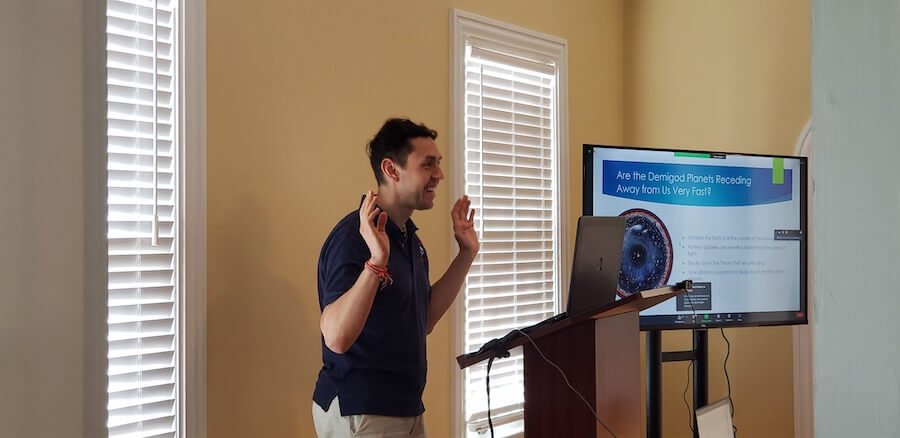 Impromptu workshop presentation by Mauricio Garrido (Murali Gopal) .jpg
Impromptu workshop presentation by Mauricio Garrido (Murali Gopal) .jpg
The entire workshop ended with a lively Q&A discussion that included virtual and local participants from both days. The diverse nature of the presentations and the rigor and scholarship of their research combined to help the BIHS in approaching the event’s purpose: considering “sastric perspectives and their teleological implications to collaboratively design a more comprehensive picture of the nature of spacetime and the origin and fate of the universe.” As one of the attendees said as the weekend came to a close, “If we can continue this level of cooperation and effort, we just might be able to actually achieve such a lofty goal!”
To review a copy of the 2022 BIHS program brochure, please see: bit.ly/BIHS_Program_Brochure_2022



